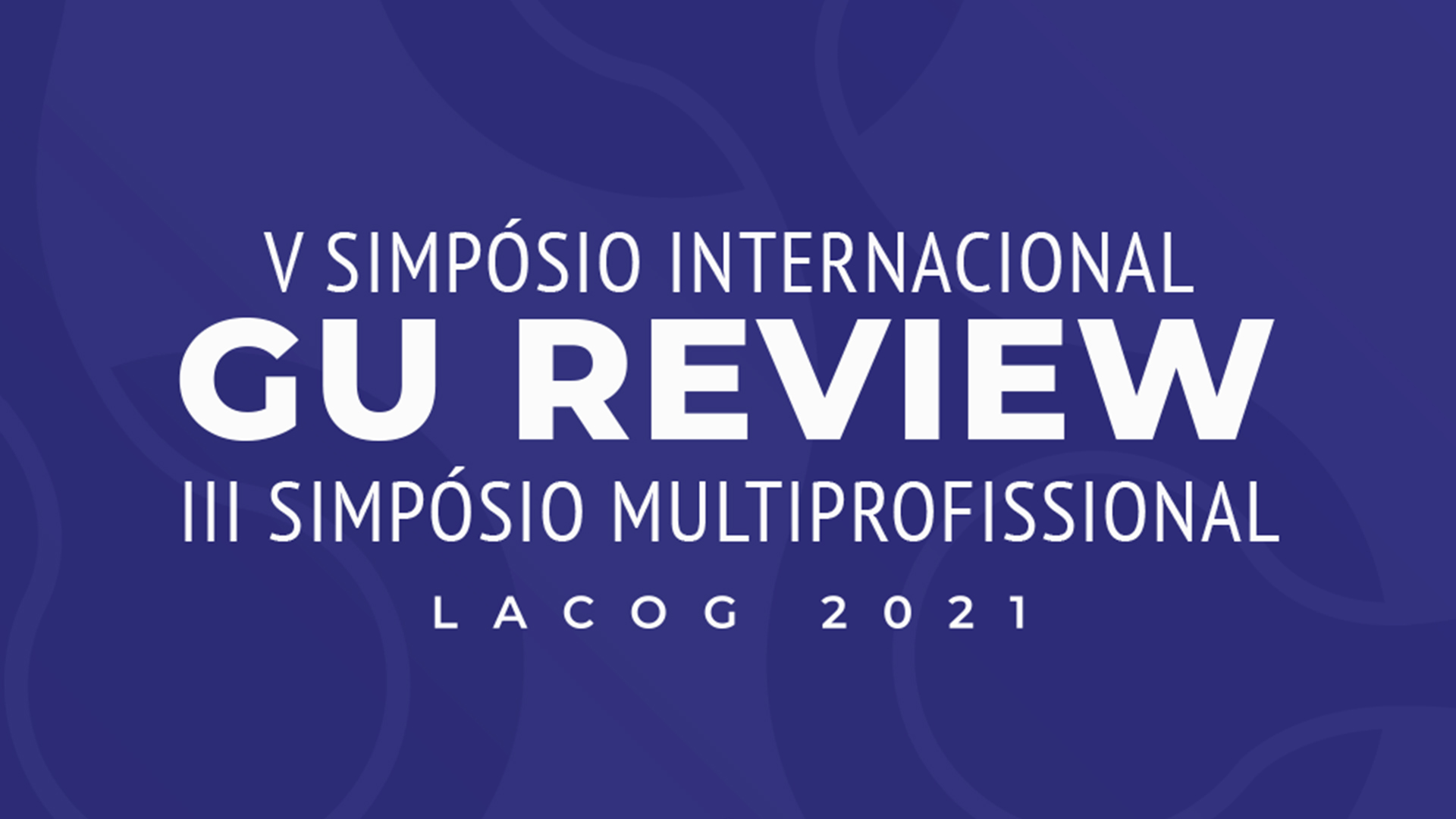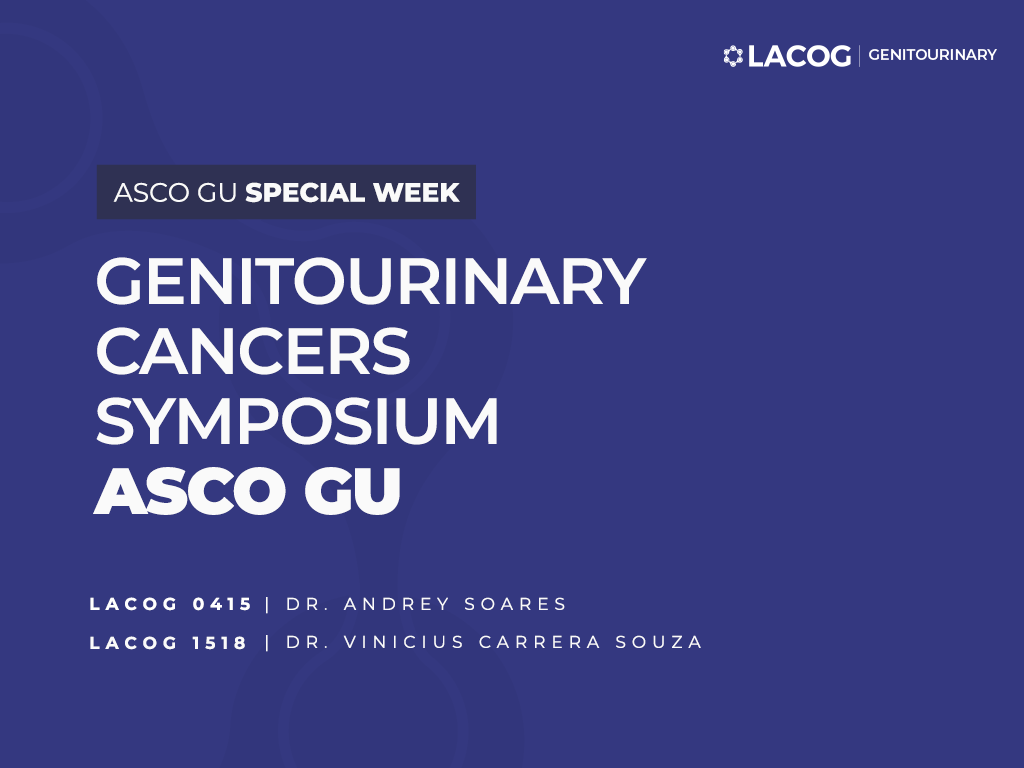V International Congress GU Review 2021
GU Review is in its 5th edition, and has become a long awaited event for oncologists. Annually, the scientific program is developed with the most actual in the treatment and diagnosis of genitourinary neoplasms. This year the congress will be broadcast online, and will present modules such as Kidney, Prostate, Penile and Bladder Cancer, bringing important national and international experts to discuss relevant topics in these areas. Subscribe now: https://rvmais.iweventos.com.br/gu-review2021
LACOG investigators presented two studies at the Genitourinary Cancers Symposium
The Genitourinary Cancers Symposium, an event organized by the ASCO focused on presenting and debating the latest research, diagnoses and treatment for genitourinary cancer, took place between February 11 and 13 in an online format. LACOG participated by presenting two studies: Bladder Cancer Registry (LACOG 1518) and the APA in Prostate Cancer (LACOG 0415). The first study, presented by Dr. Vinícius Carrera Souza, an oncologists at Instituto D’Or – Bahia, as well as an investigator and executive director for LACOG Genitourinary Group, is centered around creating a multicentric Latin American database to analyze epidemiological, clinical and pathological data; treatment; results and biological information on patients diagnosed with recurrent/metastatic transitional cell carcinoma. The second study, presented by Dr. Andrey Soares, a clinical oncologist at Hospital Israelita Albert Einstein and Centro Paulista de Oncologia and scientific director of LACOG Genitourinary Group, is being conducted with Brazilian patients and assessed several therapeutic options that present fewer adverse events and consequently gains in life quality for individuals under treatment for prostate cancer. For more information and to enroll, visit: https://meetings.asco.org/gu/attend
The lack of epidemiological data on bladder cancer led to an investigator-initiated study by a LACOG investigator
The incidence of cancer and its mortality rates have been increasing worldwide, especially in developing countries due to their growing and aging population. “Bladder cancer is the tenth most common cause of cancer across the world, with 549 thousand new cases and 200 thousand deaths estimated each year”, explains Dr. Vinícius Carrera Souza, an oncologist from the Instituto D'Or - Bahia and a researcher at LACOG. According to Dr. Souza, little is known about the epidemiology, clinical-pathological characteristics, standard treatments and outcomes of advanced urothelial carcinoma of the renal pelvis, ureter, bladder or urethra in Latin America. “The latest estimates indicated that the incidence of bladder cancer is 7 per 100,000 in men and 2.3 per 100,000 in women. However, these data are probably underestimated due to scarcity of cancer records. Fortunately, there has been an increased interest in clinical and pathological information collection regarding metastatic urothelial cancer in Latin America.” Considering that, Dr. Souza began the Bladder Cancer Registry study (LACOG 1518). The study aims to create a Latin American multicenter database to analyze epidemiological, clinical and pathological data, treatments, outcomes and biological information from patients with recurrent / metastatic urothelial cancer. The study will cover 204 patients from Brazil, Mexico, Argentina, and
A study conducted by the Genitourinary Cancer Group has been published in an important American journal
In August, the journal Clinical Genitourinary Cancer published the study “First-line treatment of metastatic renal cell carcinoma in the immuno-oncology era: systematic review and network meta-analysis”, authored by a group of researchers from the LACOG Genitourinary Group. According to Dr. Fernando Sabino, a clinical oncologist at the Oncology and Hematology Center at Santa Lúcia Hospital and the Hospital of the University of Brasilia, the aim of the study was to compare and classify the different regimens available for first-line treatment of metastatic kidney cancer. This systematic review and meta-analysis has provided some important information on which treatments are most suitable for patients with this type of tumor, as there are, to date, no studies that compare the latest approaches, e.g. combining immunological agents of different classes or combining these agents with targeted molecular therapy. “The established outcomes we looked at were overall survival, progression-free survival and response rates. The study concluded that the treatments using immunotherapy are superior to the standard treatment with Sunitinib, and that there is no one immunotherapy based treatment that is significantly superior to any other.” In Dr. Sabino’s opinion, this study has had a significant impact on patients in Latin America, because five first-line line systemic therapeutic options






